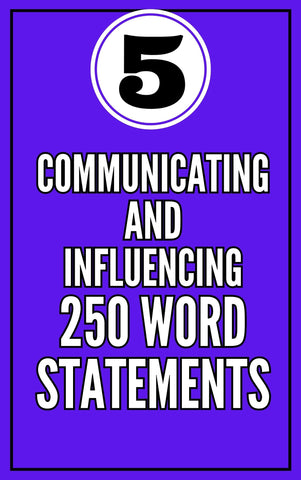Keen to become part of the Civil Service? Absolutely fantastic choice! 🎉
In the Civil Service, effective communication and influential behaviour aren't merely beneficial—they're absolutely essential. When crafting your application, it's crucial to construct engaging 250-word statements that exhibit your dedication to 'Communicating & Influencing'. Just 250 words to make a powerful impression!
Feeling a tad overwhelmed? Don't fret, we're here to guide you. In this piece, we'll assist you in shaping concise yet impactful 250-word statements that evidence your commitment to effective communication and influencing within the Civil Service. Ready to plunge in? Let's get started! 🚀

Get your hands on the comprehensive guide today! 📚
What Does "Communicating & Influencing" Really Imply?
To start off, let's define what 'Communicating & Influencing' means in the Civil Service.
In the Civil Service context, 'Communicating & Influencing' entails conveying information effectively and persuading others to align with your views or objectives. It involves active listening, clear expression, constructive feedback, and employing diplomacy and tact. It's about fostering a culture of open and effective communication that helps you and your colleagues reach common goals.
In your 250-word statements, you should highlight your commitment to communication and influencing, as well as your proactive attitude in considering various perspectives before forming an argument. Showcase scenarios where you've articulated information clearly, gave and received feedback, built rapport, and persuaded others to follow a particular course.
Structuring Your 250-Word Statements Using B-STAR ✨
Now, let's move on to how to structure your 250-word statements using the B-STAR method, focusing on 'Communicating & Influencing'. Here's the structure:
Keeping Your Statement Within the 250-Word Limit 📝
Creating a compelling 250-word statement can be challenging, but it's crucial for brevity and clarity. Here are some tips:
✅ Prioritize: Identify the most vital aspects of your story. Incorporate details that directly support your belief, situation, task, action, and result. Discard any irrelevant information.
✅ Be concise and precise: Express your thoughts clearly. Use precise language and avoid repetition. Replace lengthy phrases with single words where possible.
✅ Stick to the B-STAR method: Ensure each component of the B-STAR method is succinct. Balance the length of each section, and be clear and direct in your descriptions.
✅ Avoid repetition: Don't reiterate the same idea in different words. Each sentence should introduce new information or offer a unique insight.
✅ Review and edit: Examine your statement for opportunities to make your writing more concise. Edit rigorously, eliminating any superfluous words or sentences.
✅ Seek feedback: Ask others to review your statement. They might identify areas where you can further streamline or simplify your language.
With these tactics, you can craft a concise yet impactful 250-word statement that demonstrates your dedication to 'Communicating & Influencing' in the Civil Service.
Example Statement: Communicating & Influencing 📜
Belief: I steadfastly believe that effective communication and influencing are key in the Civil Service. I value active listening, clear expression, and persuasive dialogue, inspiring my colleagues to do the same.
Situation: During my role as a project manager at Department XYZ, we confronted a complex challenge that required skilful communication and influencing to reach desired outcomes.
Task: My role was multifaceted—I had to articulate information clearly, manage feedback, and guide my team in aligning with a common objective.
Action: Committed to communication and influencing, I facilitated open dialogues, provided constructive feedback, and encouraged consensus building. I ensured that all perspectives were considered, fostering a culture where thoughtful communication was applauded.
Result: This approach significantly contributed to achieving positive outcomes. The team embraced a more effective communication process, leading to successful results and improved stakeholder satisfaction. This experience reaffirmed my belief in 'Communicating & Influencing' and its transformative power within the Civil Service.
See 5 real-life example answers 💡
FAQ: Communicating & Influencing in the Civil Service ❓
What does 'Communicating & Influencing' mean in the Civil Service?
'Communicating & Influencing' is about conveying information effectively, considering different perspectives, and persuading others to align with your views or objectives.
Why is 'Communicating & Influencing' important in the Civil Service?
It's important because it facilitates shared understanding, effective collaboration, and alignment towards common goals. This behaviour fosters both individual and collective success, promoting efficient public service.
How can I demonstrate 'Communicating & Influencing' in my role?
You can demonstrate this behaviour by articulating information clearly, actively listening, managing feedback, and influencing others towards common goals. Promoting a culture of open dialogue also showcases this behaviour.
What are some examples of 'Communicating & Influencing'?
An example could be persuading different stakeholders to reach a consensus on a complex issue. Or, it could be providing constructive feedback to a colleague in a manner that facilitates improvement.
How can I showcase 'Communicating & Influencing' in my 250-word statement?
Use the B-STAR method (Belief, Situation, Task, Action, Result) to structure your statement. Begin by expressing your belief in the value of communication and influencing, describe a situation where you implemented this, outline your task, detail your actions, and conclude with the results.
Can 'Communicating & Influencing' apply to all roles within the Civil Service?
Absolutely. Regardless of your role, effective communication and influencing are crucial for optimum performance in the Civil Service.


